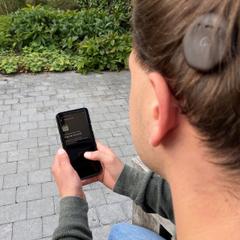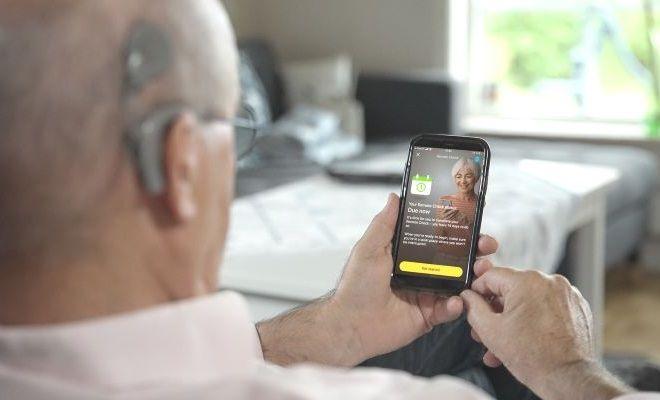People with serious hearing loss for whom classic hearing aids don't work, or work insufficiently, can also choose for a cochlear implant as a alternative. This hearing device is implanted in the inner ear (cochlea) via a surgical procedure and electrically stimulates the auditory nerve.
More than 1 million people worldwide have got a cochlear implant. In Belgium there are over 5,000 with 500 new ones being added every year.
Digital follow-up via the app
Users of a cohlear implant have to be medically monitored for the rest of their lives and have to come in regularly for hospital check-ups. A new digital application makes it possible for this monitoring to be partly done at home. This opens a new care path for the users, who can now choose to be monitored either in the hospital or at home.
Prof. dr. Nicolas Verhaert, nose-throat and ear doctor and head-neck surgeon at UZ Leuven: “Over twenty UZ Leuven patients have agreed to join a pilot project to test this new type of telemonitoring. The standard app linked to the hearing implant, has been extended and now enables all types of remote functional tests and classic surveys. This way, the audiologists and myself can assess the patient's hearing via the app, check whether the implant is working correctly and give the patient feedback. Most problems can be solved via the app. The app enables us to identify which patients need to come to the hospital for a physical appointment.”
Student Artuur (19) has already used the application and is enthusiastic: “I think the app is handy: my hearing implants can be monitored closely without me having to go to UZ Leuven. In addition to the time saving aspect, it also nice to be able to do the tests at home, when it suits me best. For me this is definitely a keeper.”
I think the app is handy: my hearing implants can be monitored closely without me having to go to UZ Leuven. Student Artuur (19)
Student Artuur (19)
Reimbursement as of 1 October 2022
As a result of the corona pandemic, digital healthcare (or e-health) gained momentum. E.g. reimbursements for phone or video consultations at the GP was organised quite quickly.
Recently the Flemish government announced that digital healthcare via outpatient rehabilitation centres would qualify for reimbursement as of 1 October. In this context telemonitoring of cochlear hearing implants for patients in a Flemish rehabilitation centre (including UZ Leuven) can also be reimbursed soon.
Flemish minister for Welfare, Public Health and Family Hilde Crevits: “Patients are getting more and more support from technology and innovation This new app is a very good example. It is Flanders' ambition to become the European hotspot for medical technology and high-quality care. We do so by working on collaboration around innovation in healthcare with a view to better care for all.”
How does a cochlear implant work?
For people with normal hearing, noise will travel via the auditory canal and the middle ear to the cochlea. Sensory cells (hair cells) then give electric signals to the brain via the auditory nerve. In case the hair cells in the cochlea are damaged, a cochlear implant can stimulate the auditory nerve direclty.
The digital application is called ‘Remote Check’ and has been developed by Cochlear, a producer of frequently used type of cochlear implants. The app allows users to perform various hearing tests at home, including questionnaires, hearing performance, impedance measurements ... European trials on Remote Check show that users appreciate annd recomment the functionality, and find it easy to use.
